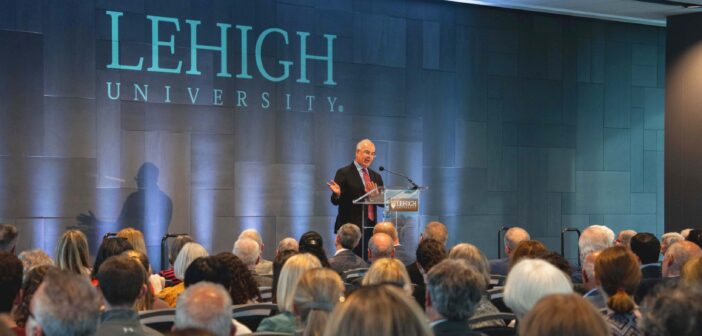David Brooks, a bestselling author, New York Times columnist and recurring commentator on PBS Newshour delivered the 2024 Hagerman Lecture from the Center of Ethics on April 9 at Iacocca Hall. Brooks spoke about the necessity of repairing the American social fabric through moral formation in education. Brooks spoke with The Brown and White to speak about pressing ethical issues facing Lehigh and beyond.
Q: What role do you think artificial intelligence has in the future of journalism?
David Brooks: I’ve never used it for professional purposes, I’ve fiddled around with it, but I would never let it write a column of mine. In part because people say, “Let it do your first draft then fix it,” but the first draft is really where you do all of your thinking, and the goal should be making that first draft as hard as possible, not as easy as possible. And frankly, I find when I ask it questions it’ll occasionally give me a point I haven’t heard of, but most of the answers are so vague and generic that you never want to rely upon them let alone, with the hallucinations and all of that kind of stuff. I have a pretty positive view of AI in general, more than the median American, in part because I think it really will help us with some big problems, like health research. But I don’t think it’s going to be like us. I think it’ll be a different form of intelligence but not one that will replace us. Similarly, I ask neuroscientists, “Do you think they’ll make an AI that thinks like a human?” and the neuroscientist will say, “We don’t know how humans think.” So, we have a lot of features that AI does not have, like an individual voice, a body, emotions, understanding the world.
Q: What would you say to young Americans right now during an election year when they are feeling disappointed about entering a presidential rematch?
DB: I guess I’d say first, care about politics. If you don’t care about politics, it’s because you live in a country peaceful enough that gives you the luxury of not caring, but if you live in a country where there’s corruption or where they might put a bullet in your head, you really have to care about politics. Second, people are cynical and I understand why people are like, “What’s the point of politics,” but, you know, I live in Washington so I know a lot of people who have served in government and for almost all of them the time they spent in the White House or in Congress was the most rewarding time of their lives. If you’re a mayor or a local official, you can see concrete things you did, and so with civics or elections, I’m sure that this one will be intellectually exhausting, but overall I think most politicians I know are better in private than they appear in public.
Q: What would you say to people in the U.S. who are feeling the Israel-Palestine conflict very deeply and may not know exactly how to get involved?
DB: I mean it’s striking to me how intensely everybody feels about this conflict. You know I grew up in a Jewish home, so I have some visceral connection to it and I’ve probably been there 25 or 30 times covering the Middle East. I feel I have a visceral connection, but I feel like everybody has a visceral connection. It’s made a lot of college campuses really divided, it’s made a lot of people on each side feel unsafe, and it’ll be interesting to me how people greet the current face because Israel is more or less withdrawn from southern Gaza, but what happens if Hamas comes back? It’s just struck, even my Twitter feed after Oct. 7, just blew up with rancor. It really affected, maybe even as much as Trump in 2016, like really got peoples’ passions. I’m all for students expressing their passions, I don’t like when events are shut down, maybe that’s because I’m a speaker. But, I just think do your protest but let events go forth … I used to take these reporting trips to travel all around Israel, and also the West Bank and also Gaza, Jordan and Egypt, and all these places and so I got all these points of view. I would say in the Middle East there’s a class of people who are the professional peace process people. And they’re on all different sides, and they all get along. It’s like they’ve been playing chess their whole life. And they sort of understand each other and they generally respect each other. Hamas is not in that because they were never in the peace process business. One of the things I’ve learned in general is that, we have a saying, “If you don’t go you don’t know.” That, when I used to go to, say, the Middle East for two weeks, I would have about a three-month window where I still sort of knew what was going on, but after that three-month window I just didn’t know, because things had changed. So, I would write about it during that window and hopefully go back within the next six months. It’s a big mistake to think what’s happening in the Middle East is like anything that’s happening here. I do feel a lot of people just take America’s racial injustice problem and then just map it onto the Middle East, which is not really applicable.
Q: What is the outlook for universities, like Lehigh, when it comes to current struggles with inclusivity and incorporating all types of students and experiences?
DB: In general, I mean we have great universities. I visit a lot of them and I know this one is a very great university, so I don’t want to dump on universities, but they’ve got a couple problems that they’re facing. One is, rich kids just have such an advantage getting into a place like this. From eighth grade on, the children of rich parents are like four grade levels above. And so at a place like where I’m teaching, at the University of Chicago, or Lehigh, you want to have the people who are really qualified, but you can’t just have a class that’s like more kids from the top 1% than the bottom 60%. That’s a problem that needs to be solved. The second thing that needs to be solved is AI will redefine intelligence for us. I don’t know how, but it will, and so schools have to redefine their own definition of what intelligence is. Right now we sort of sort society between how you do on your IQ test, your SAT, and whether you’re good at pleasing your teachers between the ages of 15 and 22. That just strikes me as a ridiculous way to sort society. What we need is a much broader definition of intelligence, or merit, that encompasses the whole person.
Q: What do you think is the biggest challenge to our ethical world in today’s society?
DB: To me the sort of social and relational breakdown of society is just a big problem and with rising mental health issues, rising suicides, the number of people who say they have no friends is up fourfold, the number of high school students who say they’re constantly despondent and hopeless is up 45%, so there’s just a lot of terrible social indicators, especially striking people who are college-aged now. How do we deal with that? One of the reasons I wrote my last book, is part of it is probably putting phones off to the side for some period of every day, but part of it is just having basic social skills. How to ask for forgiveness, how to break up with somebody without destroying them, how to build a friendship, how to invite people over, how to ask them out on a date. I think we somehow have to fix this social and relational crisis, for especially Gen Z, who is right in the middle of it. It’s like one of the problems that history has summoned you guys to answer.






Comment policy
Comments posted to The Brown and White website are reviewed by a moderator before being approved. Incendiary speech or harassing language, including comments targeted at individuals, may be deemed unacceptable and not published. Spam and other soliciting will also be declined.
The Brown and White also reserves the right to not publish entirely anonymous comments.